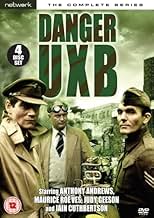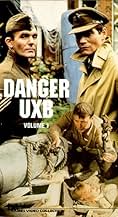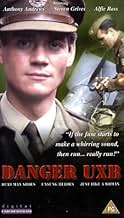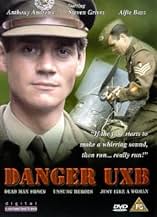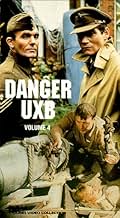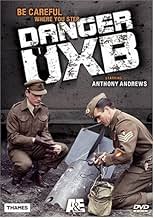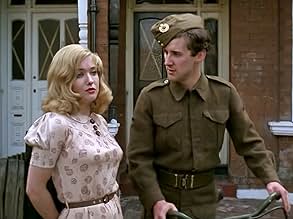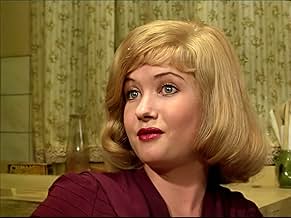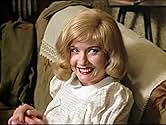Danger UXB
- Série de TV
- 1979
- 1 h
AVALIAÇÃO DA IMDb
8,4/10
1,1 mil
SUA AVALIAÇÃO
Adicionar um enredo no seu idiomaThe series chronicles the exploits of the fictional Royal Engineer Tunnelling Company 97, which has been made a bomb disposal unit to deal with the thousands of unexploded bombs ("UXBs") in ... Ler tudoThe series chronicles the exploits of the fictional Royal Engineer Tunnelling Company 97, which has been made a bomb disposal unit to deal with the thousands of unexploded bombs ("UXBs") in London during the Battle of Britain.The series chronicles the exploits of the fictional Royal Engineer Tunnelling Company 97, which has been made a bomb disposal unit to deal with the thousands of unexploded bombs ("UXBs") in London during the Battle of Britain.
Explorar episódios
Avaliações em destaque
I watched this programme when it was first broadcast. I'd not seen it in 40 years until Talking Pictures started showing it again recently. I wondered how well it would stand up now. I wasn't disappointed, it is exceptional. If you get a chance to watch it from the beginning, don't miss it. Drama at its very best.
I just saw it on video 20 years after first watching it on PBS. Great storytelling, great acting, great writing. John Hawkesworth made this well: he neither missed nor flubbed a detail, nor did he insert any improbable or cliched lines or angles. The actual stories themselves are simple enough: a few romances, comradery among the old boys, mateship among the men, a commanding idiot, the proverbial English eccentric ...
But hanging over all their heads - literally - is the Nazi Blitz and its delayed-fuse calling-cards in particular. The fuses kept changing, forcing the engineers to respond to them.
Hawkesworth didn't cop the "budget restraints" plea with "Danger UXB" like so many others would have done; he used what he could get to their fullest. He used the actual techniques used by EOD, RE, in exact detail, using real defused German bombs. I could almost feel the cold mud, a dull counter-part to the sheer terror.
Period pieces are 100% dependent on the details to give their full effect. A wrong uniform, a 50-star flag in the 1940s, an anachronistic hairstyle or remark or attitude gives it all away every time. Hawkesworth gives nothing away in "Danger UXB;" he neither exaggerates nor underplays anything, nor does he throw in a "portent of the future" or "meeting the historical figure."
As for the actors: superlatives won't do them justice. Talent abounds in well-written parts, great and small, with no room for star-tripping anywhere. Every role depends upon with whom they interact. About the only one I thought *may* have been short-shrifted was Maurice Röeves as Sgt. James; he seemed to be chomping on the bit to do more than bark orders, nurse the men or flip a coin through his fingers in a pub. Still, he was thoroughly believable as the backbone of Section 347.
So: I liked it.
But hanging over all their heads - literally - is the Nazi Blitz and its delayed-fuse calling-cards in particular. The fuses kept changing, forcing the engineers to respond to them.
Hawkesworth didn't cop the "budget restraints" plea with "Danger UXB" like so many others would have done; he used what he could get to their fullest. He used the actual techniques used by EOD, RE, in exact detail, using real defused German bombs. I could almost feel the cold mud, a dull counter-part to the sheer terror.
Period pieces are 100% dependent on the details to give their full effect. A wrong uniform, a 50-star flag in the 1940s, an anachronistic hairstyle or remark or attitude gives it all away every time. Hawkesworth gives nothing away in "Danger UXB;" he neither exaggerates nor underplays anything, nor does he throw in a "portent of the future" or "meeting the historical figure."
As for the actors: superlatives won't do them justice. Talent abounds in well-written parts, great and small, with no room for star-tripping anywhere. Every role depends upon with whom they interact. About the only one I thought *may* have been short-shrifted was Maurice Röeves as Sgt. James; he seemed to be chomping on the bit to do more than bark orders, nurse the men or flip a coin through his fingers in a pub. Still, he was thoroughly believable as the backbone of Section 347.
So: I liked it.
Anthony Andrews stars in the 1979 series UXB (unexploded bombs). Andrews plays Brian Ash, a lieutenant assigned to a UXB unit during World War II.
If a bomb dropped but didn't explode, it was up to this unit to defuse it so it would no longer be a danger. Of course you had to be careful it didn't blow up in your face. Also there were delayed- fuse bombs set to go off later.
The show uses actual procedures, some of which were only experimental, that were applied to defuse these bombs. Initially these procedures were published, I gather, to boost morale, but the publication helped the Germans design bombs that would overcome the processes. Now the procedures, understandably, are classified.
Danger UXB is terrifying to watch at times, because you simply don't know if the bomb will go off or not. There are no guarantees that a character is going to live - like in real life.
What one is struck by watching this show is how archaic the methods were - huge, awkward machinery, and no protection for the soldier disarming the bomb.
The show stands out not only for its use of real German bombs and the details of the time, but for the real human stories that it tells, with no clichés. Ash is a good, principled man, but he's often scared right down to his socks.
The cast is uniformly excellent: Besides Andrews, Maurice Roeves, Kenneth Cranham, Iain Cuthbertsome, Deborah Watling, Gordon Kane, George Innes, and Judy Geeson, plus many others.
I am watching this on Netflix - if you didn't see it originally, see it now - it's fabulous.
If a bomb dropped but didn't explode, it was up to this unit to defuse it so it would no longer be a danger. Of course you had to be careful it didn't blow up in your face. Also there were delayed- fuse bombs set to go off later.
The show uses actual procedures, some of which were only experimental, that were applied to defuse these bombs. Initially these procedures were published, I gather, to boost morale, but the publication helped the Germans design bombs that would overcome the processes. Now the procedures, understandably, are classified.
Danger UXB is terrifying to watch at times, because you simply don't know if the bomb will go off or not. There are no guarantees that a character is going to live - like in real life.
What one is struck by watching this show is how archaic the methods were - huge, awkward machinery, and no protection for the soldier disarming the bomb.
The show stands out not only for its use of real German bombs and the details of the time, but for the real human stories that it tells, with no clichés. Ash is a good, principled man, but he's often scared right down to his socks.
The cast is uniformly excellent: Besides Andrews, Maurice Roeves, Kenneth Cranham, Iain Cuthbertsome, Deborah Watling, Gordon Kane, George Innes, and Judy Geeson, plus many others.
I am watching this on Netflix - if you didn't see it originally, see it now - it's fabulous.
Just finished viewing the 13 episode, 4 disk DVD set of "Danger UXB". Second time around--I saw the series many years ago on PBS.
All the performances are outstanding but, I would like to single out Maurice Röeves as Sergeant James. Why he did not win a best actor award for 1979 is beyond me. I checked his IMDb biography...no awards. Maurice Röeves uncompromising portrayal ranks, in my opinion, right up with George C. Scott's "Patton" for outstanding screen performances.
Rent (or buy) the 4 disk DVD set--well worth the 13 viewing hours. DVD picture and sound are very good. My only complaint about the DVD production--no closed captioning. The text is useful (to this mid-westerner) for understanding rapidly spoken dialogue.
All the performances are outstanding but, I would like to single out Maurice Röeves as Sergeant James. Why he did not win a best actor award for 1979 is beyond me. I checked his IMDb biography...no awards. Maurice Röeves uncompromising portrayal ranks, in my opinion, right up with George C. Scott's "Patton" for outstanding screen performances.
Rent (or buy) the 4 disk DVD set--well worth the 13 viewing hours. DVD picture and sound are very good. My only complaint about the DVD production--no closed captioning. The text is useful (to this mid-westerner) for understanding rapidly spoken dialogue.
This is an outstanding story of a British EOD (Explosive Ordnance Disposal) Detachment during World War II. The ordnance depicted along with the fusing used was actually used by the Germans during WWII. The methods used in the show are the actual (in some cases, trial and error) procedures used to defeat the ordnance during WWII.
The RSP (render safe procedures) used today for foreign ordnance is usually classified. The main reason for this is so the enemy doesn't know that you can defeat his weapons. The British, during WWII, initially published that they defeated certain German ordnance and the RSP used as a morale booster for the citizens. The Germans, reading these accounts, then designed some of the fuses with booby traps specifically designed to kill the British EOD soldiers while they were working on the UXBs if they followed the published procedures.
During WWII, the US Army EOD was modeled after the British detachments. Initially, the US turned to the British for training and help in getting our own EOD units established.
One of my greatest joys from this series was the fact that I had taped it the first time I watched and then got to watch it over again with a close friend. The significance of this was: 1) I was US Army EOD, and 2) the close friend was a British EOD tech who had been awarded the George's Medal for his EOD work in Northern Ireland. To show what a tight knit group EOD personnel are - we still stay in touch with one another via the Internet after 26 years (we watched the show together in 1983).
The RSP (render safe procedures) used today for foreign ordnance is usually classified. The main reason for this is so the enemy doesn't know that you can defeat his weapons. The British, during WWII, initially published that they defeated certain German ordnance and the RSP used as a morale booster for the citizens. The Germans, reading these accounts, then designed some of the fuses with booby traps specifically designed to kill the British EOD soldiers while they were working on the UXBs if they followed the published procedures.
During WWII, the US Army EOD was modeled after the British detachments. Initially, the US turned to the British for training and help in getting our own EOD units established.
One of my greatest joys from this series was the fact that I had taped it the first time I watched and then got to watch it over again with a close friend. The significance of this was: 1) I was US Army EOD, and 2) the close friend was a British EOD tech who had been awarded the George's Medal for his EOD work in Northern Ireland. To show what a tight knit group EOD personnel are - we still stay in touch with one another via the Internet after 26 years (we watched the show together in 1983).
Você sabia?
- CuriosidadesBy a bizarre coincidence, actor Anthony Andrews was jotting down some thoughts for a series about wartime bomb-disposal officers when producer John Hawkesworth telephoned him and, out of the blue, offered him the role of Brian Ash in Danger UXB (1979).
- ConexõesFeatured in Verity Lambert: Drama Queen (2008)
Principais escolhas
Faça login para avaliar e ver a lista de recomendações personalizadas
- How many seasons does Danger UXB have?Fornecido pela Alexa
Detalhes
Contribua para esta página
Sugerir uma alteração ou adicionar conteúdo ausente


